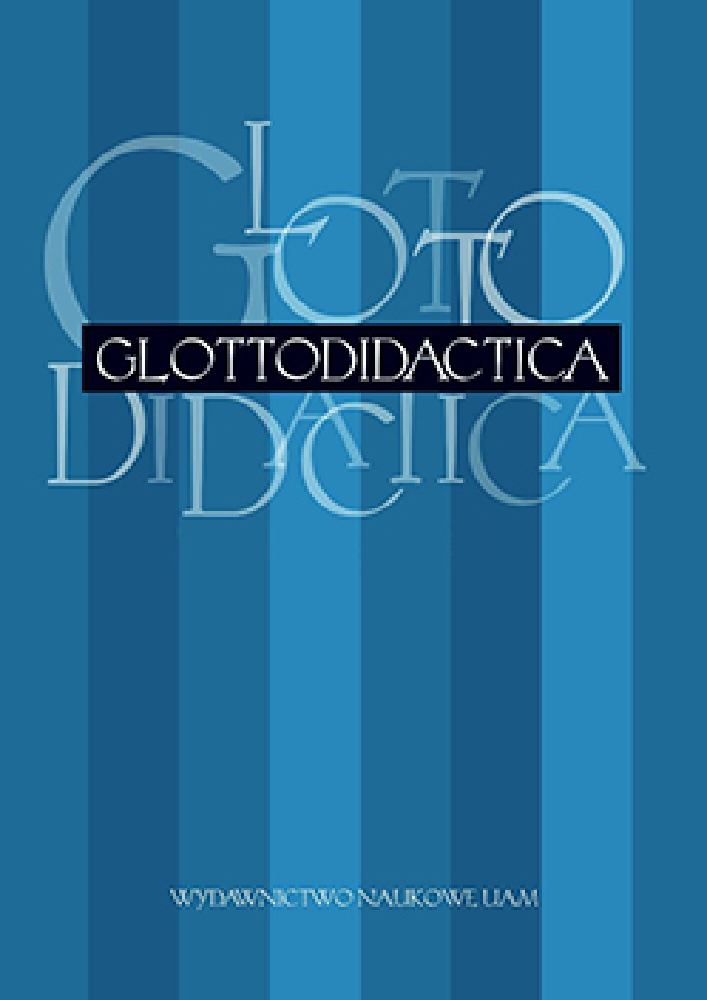Résumé
The aim of the text is to discuss the possibilities of developing professional self-awareness at the stage of initial education of foreign language teachers. The first part of the article presents theoretical considerations on teachers’ professional self-consciousness, distinguishing three areas of it: professional competence as goals to be achieved, self-evaluation and self-regulation, and teachers’ cognitive, emotional and communicative functioning in professional situations. The second part of the text contains an analysis of selected practical tools that serve to develop teachers’ professional self-awareness, such as The European Portfolio for Student Teachers of Languages, and the European Profiling Grid, tools inspired by E. Berne’s concept of Transactional Analysis, and the author’s reflection grids. The conclusions of the analysis indicate the possibility of the coherent use of available tools and creation of additional tools within the context of education, so that the process of developing teachers’ self-awareness is multifaceted and leads to a sense of professionalism.
Références
Berne, E. (1957). Ego states in psychotherapy. American Journal of Psychotherapy, 11(2), 293–309.
Bleichenbacher, L. (coord.) (2019). Guide des compétences enseignantes pour les langues dans l’éducation. https://www.ecml.at/ECML-Programme/Programme2016-2019/Guidetoteachercompetences/tabid/1850/language/fr-FR/Default.aspx
Chalvin, D. (2003). Les outils de base de l’analyse transactionnelle. Pour développer l’énergie des individus et des organisations. Paris : ESF Éditeur.
Czykwin, E. (1998). Samoświadomość nauczyciela. Kraków: Oficyna Wydawnicza Impuls.
Eaquals, (2013). Eaquals Framework for Language Teacher Training and Development. https://www.eaquals.org/our-expertise/teacher-development/the-eaquals-framework-for-teacher-training-and-development/
Galluzzo, G. (2005). Performance Assessment and Renewing Teacher Education : The Possibilities of the NBPTS Standards. The Clearing House : A Journal of Educational Strategies, Issues and Ideas, vol. 78 /4, 142–145.
Jagieła, J. (2017a). Znaczenie modelu płynności funkcjonalnej Susannah Temple (FF – functional fluency) dla edukacyjnej analizy transakcyjnej. Edukacyjna Analiza Transakcyjna, 6, 19–48.
Jagieła, J. (2017b). Samoświadomość nauczycieli w koncepcjach edukacyjnej analizy transakcyjnej. Pedagogika, v. XXVI n. 1, 69–83. http://dx.doi.org/10.16926/p.2017.26.06
Kumaravadivelu, B. (2001). Toward a postmethod Pedagogy. TESOL Quarterly, vol. 35/4, 537–560.
Kumaravadivelu, B. (2012). Language Teacher Education for a Global Society. A Modular Model for Knowing, Analyzing, Recognizing, Doing, and Seeing. New York, NY: Routledge.
Madalińska-Michalak, J. / Góralska, R. (2012). Kompetencje emocjonalne nauczyciela. Warszawa: Wolters Kluwer Polska SA.
Newby, D. / Allan, R. / Fenner, A.-B. / Jones, B / Komorowska, H. / Soghikyan, K. (2007). Portfolio européen pour les enseignants en langues en formation initiale (PEPELF). Graz : Centre européen pour les langues vivantes.
Paquay, L. / Van Nieuwenhoven, C. / Wouters, P. (2010). L’évaluation, levier du développement professionnel ? TensonsTensions, dispositifs, perspectives. Bruxelles : De Boeck.
Pankowska, D. (2010). Nauczyciel w perspektywie analizy transakcyjnej. Lublin: Wydawnictwo UMCS.
Pierre, N. (2005). Pratique de l’Analyse Transactionnelle dans la classe. Avec des jeunes et dans les groupes. Paris : ESF Éditeur.
Rubinstein, S.L. (1964). Podstawy psychologii ogólnej. wyd. II. Warszawa: PWN.
Sadler, R. / Dooly, M. (2016). Twelve years of Telecollaboration: What we have learnt. ELT Journal vol. 70/4, 401–413. http://dx.doi.org/10.1093/elt/ccw041
Shobeiry, M. (2013). Self –Efficacy and Self –Awareness of Language Teachers and Their Learners’ Achievement. The Asian Conference on Language Learning 2013. https://www.researchgate.net/publication/342154519_Self_-Efficacy_and_Self_-Awareness_of_Language_Teachers_and_Their_Learners’_Achievement
Sidash, N. / Roganova, M. / Domina,V. / Victorova, L. / Roganov, M. / Miroshnichenko, V. (2020). Pedagogical Consciousness Formation of Future University Educators in the Process of Teaching English. Universal Journal of Educational Research 8 (4), 1202–1211. DOI: 10.13189/ujer.2020.080410
Szymankiewicz, K. (2017). Przyszli nauczyciele języków obcych na drodze budowania kompetencji zawodowej. Refleksja – Uczenie się – Rozwój. Warszawa et al.: Instytut Romanistyki – Werset.
Temple, S. (1999). Functional Fluency for Educational Transactional Analysts. Transactional Analysis Journal, vol. 3 (29), 164–174. https://doi.org/10.1177/036215379902900302
Temple, S. (2002). The development of a transactional analysis psychometric tool for enhancing functional fluency. (Unpublished doctoral dissertation). University of Plymouth, Plymouth, England.
Temple, S. (2015). Celebrating Functional Fluency and Its Contribution to Transactional Analysis Theory. Transactional Analysis Journal, vol. 45/1,10–22. DOI: 10.1177/0362153714568803
The European Profiling Grid (EPG), (2013). https://egrid.epg-project.eu/fr?language=fr
Werbińska, D. (2004). Skuteczny nauczyciel języka obcego. Warszawa: Fraszka Edukacyjna.
Werbińska, D. (2013). Kompetencje początkującego nauczyciela języka angielskiego w świetle modelu KARDS B. Kumaravadivelu. Neofilolog, 40/2, 279–301.
Zawadzka, E. (2004). Nauczyciele języków obcych w dobie przemian. Kraków: Oficyna Wydawnicza Impuls.
Licence
 This work is licensed under a Creative Commons Attribution-NoDerivatives 4.0 International License.
This work is licensed under a Creative Commons Attribution-NoDerivatives 4.0 International License.
Authors
Authors of texts accepted for publication in Glottodidactica are required to complete, sign and return to the Editorial team’s office the Agreement for granting a royalty-free license to works with a commitment to grant a CC sub-license.
Under the agreement, the authors of the texts published in Glottodidactica grant Adam Mickiewicz University in Poznań a non-exclusive, royalty-free license and authorize the use of Attribution-NoDerivatives 4.0 International (CC BY-ND 4.0) Creative Commons sub-license.
The authors retain the right to the free disposal of the work.
Users
Interested Internet users are entitled to use works that have been published in Glottodidactica since 2016, under the following conditions:
▪ attribution – obligation to provide, together with the distributed work, information about the authorship, title, source (link to the original work, DOI) and the license itself.
▪ no derivatives – the work must be preserved in its original form. Without the author's consent, it is not possible to distribute the modified work in the form of translations, publications, etc.
Copyrights are reserved for all texts published before 2016.
Miscellaneous
Adam Mickiewicz University in Poznań retains the property right as a whole (layout, graphic form, title, cover design, logo etc.).
Privacy statement
The names and email addresses published on this journal site will be used exclusively for the purposes declared by this journal and cannot be used for any other purpose or by any other party.





